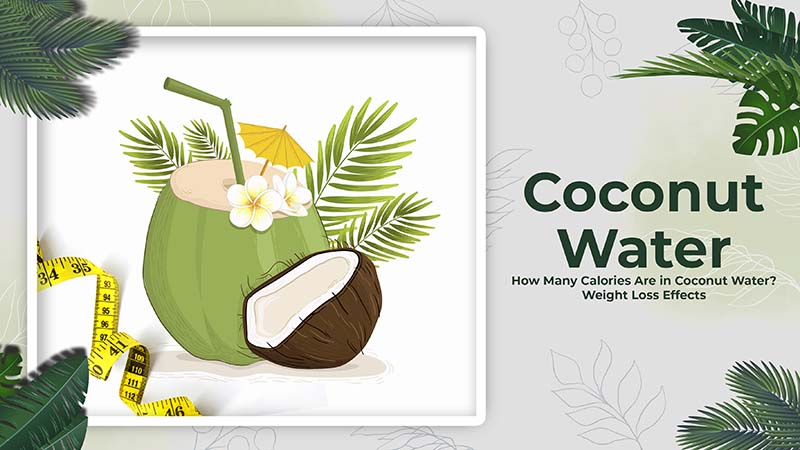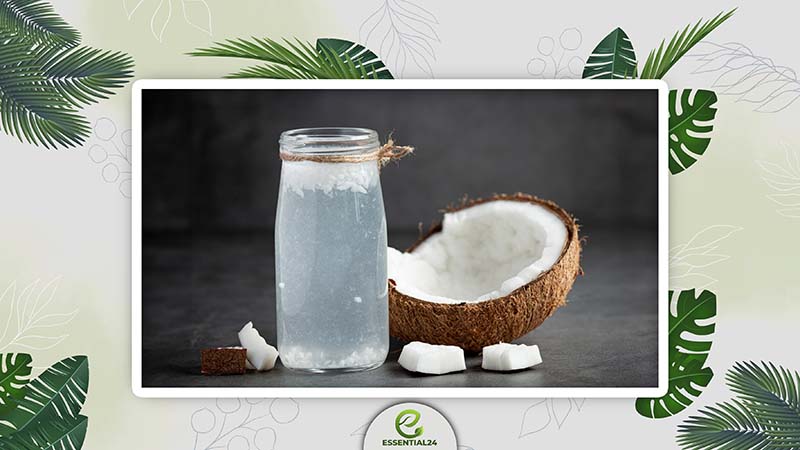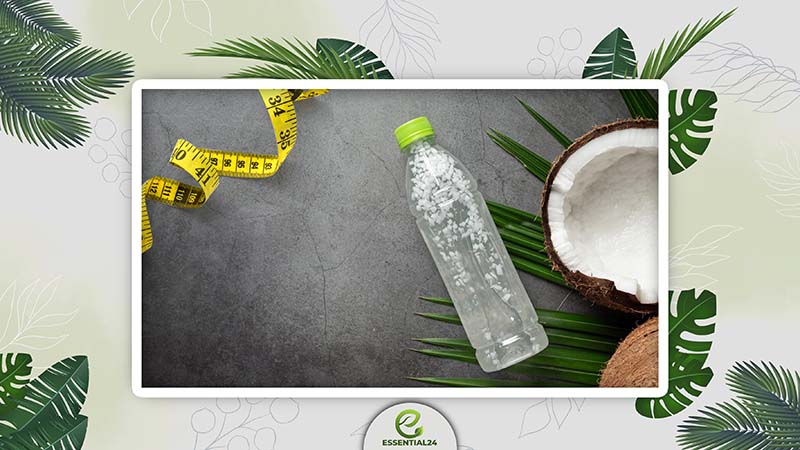Coconut water is well-loved for its hydrating, refreshing, and healthy qualities. Packed with essential minerals straight from nature, it offers benefits like supporting heart health and preventing kidney stones. Especially for folks who love staying active, coconut water is a go-to choice for replenishing lost electrolytes after a workout. But amidst its known perks, one question lingers related to its nutritional content: “How Many Calories Are in Coconut Water?” This query is crucial for those considering coconut water’s role in weight management. Let’s take a closer look. Let’s take a closer look. Join Essential24 in the article below.

1. Nutritional Breakdown of Coconut Water
One cup (245g) of 100% coconut water packs in 44 calories, 0.5g of protein, 10.4g of carbohydrates, and 0g of fat. It’s also a noteworthy source of vitamin C. Here’s a detailed breakdown based on information from the USDA:
- Calories: 44
- Fat: 0g
- Sodium: 64mg
- Carbohydrates: 10.4g
- Fiber: 0g
- Sugars: 9.6g
- Protein: 0.5g
- Vitamin C: 24.3mg
- Potassium: 404mg
Carbohydrates: A single cup of coconut water provides about 10 grams of carbohydrates, mainly from natural sugars. It’s advisable to check labels for added sugars if you’re mindful of your sugar intake.
Fats: Coconut water typically contains negligible amounts of fat, often less than 1 gram, although some brands might have slight variations.
Protein: While coconut water isn’t a significant source of protein, its content may vary slightly between different brands.
Vitamins and Minerals: Coconut water is an excellent source of vitamin C, with 24mg per serving, fulfilling 32% of the RDA for women and 27% for men, based on a 2,000-calorie diet. Additionally, it contains thiamin (approximately 8% of RDA).
Mineral-wise, coconut water packs a punch with potassium, offering 404mg (16% of adequate intake for women and 12% for men). It also provides manganese (0.5mg or 28% of adequate intake for women and 22% for men), along with smaller amounts of magnesium, calcium, iron, phosphorus, zinc, and copper.

2. Calories in Coconut Water
A single cup (240g) of 100% coconut water supplies 44 calories. Of this, approximately 75% derive from carbohydrates, 15% from protein, and 10% from fat. Notably, coconut water is a low-calorie beverage.
In comparison to other electrolyte sports drinks containing sugar, coconut water stands out for its significantly lower calorie content. For instance, a 20-ounce bottle of Gatorade carries 140 calories, equivalent to about 65 calories in a cup. Similarly, nutrient-rich beverages like orange juice boast higher calorie counts, with approximately 110 calories per cup. These variations in calorie content predominantly stem from sugar content, a component that coconut water contains in lesser amounts.
In contrast to other coconut products, coconut water emerges as a lower-calorie alternative to coconut milk. This variance is due to coconut water’s lower fat content. While coconut water isn’t a direct substitute for coconut milk in recipes, it’s beneficial to compare their calorie content for beverage purposes. Canned coconut milk, for instance, packs a hefty 445 calories per cup. On the other hand, boxed coconut milk designed for drinking carries a lighter load at 70 calories per cup.
3. The Health Advantages of Coconut Water
Coconut water has garnered attention for its potential health benefits, although its previous acclaim may have been overstated. Nevertheless, it remains a source of various nutrients that can bolster health, notably electrolytes like potassium, magnesium, and sodium. Here are some potential health advantages associated with coconut water:
Helps Protect Against Free Radicals: Rich in antioxidants, coconut water aids in shielding the body against free radicals—unstable molecules that can inflict harm on cells and potentially contribute to cancer. While coconut water alone isn’t a cure or preventive measure for cancer, its antioxidant content can aid in combating cellular damage.
May Help Reduce Blood Sugar: While primarily observed in animal studies, coconut water has shown potential in improving blood sugar levels. However, extensive research in human subjects is warranted to validate these findings.

May Reduce Blood Pressure: A limited human study demonstrated a decrease in blood pressure with increased consumption of coconut water. This effect could be attributed to the potassium content of coconut water, as low potassium intake heightens the risk of hypertension.

May Help Balance Electrolytes: Many enthusiasts turn to coconut water as a post-exercise electrolyte supplement. It offers essential electrolytes like sodium, potassium, calcium, and magnesium, along with carbohydrates to enhance muscle function. Additionally, it boasts fewer calories than conventional sports drinks and is gluten-free. However, similar benefits can be obtained from whole foods like potassium-rich bananas, which are free from hidden ingredients like added sugar and often more economical than sports drinks or recovery bars.
May Reduce Diabetic Retinal Damage: While research in this area has primarily involved rats, studies indicate a potential reduction in retinal damage associated with diabetes in subjects administered coconut water. Further investigation is necessary to determine if these effects translate consistently to humans.
May Prevent Kidney Stones: A small-scale study indicated that coconut water facilitated the excretion of potassium, chloride, and citrate, thereby mitigating the risk of kidney stone formation.

4. Are There Any Side Effects to Drinking Coconut Water?
Although potassium is essential for health, consuming it in excess can cause hyperkalemia, marked by too much potassium in the blood. Given that coconut water is rich in potassium, consuming large quantities could potentially contribute to this issue. While it’s uncommon for most individuals, those with chronic kidney disease or those taking medications such as ACE inhibitors should exercise caution.
Additionally, coconut water contains high levels of FODMAPs, a group of carbohydrates known to trigger or exacerbate digestive symptoms in individuals with irritable bowel syndrome (IBS). Therefore, individuals adhering to a low-FODMAP diet may need to limit or avoid coconut water if it triggers symptoms for them.
Note:
- Moderation is key when consuming coconut water, particularly for individuals with underlying health conditions or specific dietary requirements.
- It’s advisable to consult with a healthcare professional if you have concerns about incorporating coconut water into your diet, especially if you have existing health conditions or are following a specialized diet plan.
5. Weight Loss: Can Coconut Water Contribute?
Coconut water is touted for its potassium content and rich array of bioactive enzymes, both of which are believed to enhance the body’s metabolic rate. This boost in metabolism aids muscles in burning more calories, potentially aiding in weight loss efforts. By incorporating coconut water into your daily routine, you can keep your body refreshed while supporting weight loss goals. It serves as a healthier alternative to sugary drinks and soda and can even replace plain water during workout sessions.
With approximately 48 calories per cup and free from added fillers, coconut water presents a low-calorie beverage option for those seeking to shed pounds. Carrying a bottle of coconut water throughout the day ensures easy access to this refreshing drink, satisfying cravings on hot days without resorting to calorie-laden snacks.
Moreover, coconut water imparts a sense of fullness, a valuable asset for individuals aiming to control their calorie intake. Enjoying coconut water post-light lunch can serve as a satisfying dessert, offering sweetness to the palate while supplying essential nutrients to the body.

6. Who Should Refrain from Using Coconut Water as a Weight Loss?
While coconut water can be a beneficial addition to a weight loss regimen for many individuals, there are certain groups who should exercise caution or avoid its use altogether:
Pregnant or Breastfeeding Individuals: Due to insufficient reliable information on the safety of coconut water during pregnancy and breastfeeding, it is advisable for pregnant or breastfeeding individuals to refrain from using it as a weight loss aid. Consulting with a healthcare provider is recommended to ensure dietary choices align with individual health needs during these periods.
Individuals with Kidney or Heart Disease: Those with kidney or heart disease should approach coconut water consumption with caution. The high potassium content of coconut water may not be suitable for these conditions, potentially exacerbating health issues. Consulting with a healthcare provider is essential to determine whether coconut water is appropriate for inclusion in the diet and to ensure it aligns with overall treatment plans.
7. Effective Utilization of Coconut Water for Optimal Benefits
Harnessing the versatility of coconut water opens up numerous avenues for enjoying its benefits beyond simple hydration. Here are some creative ways to incorporate coconut water into your routine:
- Smoothies: Blend coconut water with your favorite fruits and leafy greens for a refreshing and nutritious smoothie. Its natural sweetness adds a delightful flavor while providing hydration and essential nutrients.
- Cocktails: Use coconut water as a base for cocktails to add a tropical twist to your drinks. Mix it with rum, vodka, or tequila for a refreshing and hydrating beverage.
- Frozen Fruit Pops: Pour coconut water into popsicle molds along with chopped fruits like berries, mangoes, or kiwis. Freeze them for a delicious and hydrating treat on hot days.
- Hangover Relief: While there’s limited scientific data to support its efficacy, some people turn to coconut water to alleviate the effects of a hangover. Its hydrating properties may help replenish fluids lost due to alcohol consumption. Opting for non-alcoholic and hydrating fluids, including coconut water, can potentially mitigate hangover symptoms.
By exploring these creative uses of coconut water, you can maximize its benefits while enjoying a refreshing and flavorful addition to your diet.
8. Conclusion
In wrapping up the query, “How Many Calories Are in Coconut Water?”, it’s clear that this refreshing beverage is not just about low calorie content but also about enhancing overall health. With only 44 calories per cup and a wealth of essential nutrients, coconut water supports weight loss, boosts metabolism, and replenishes vital electrolytes. Ideal for anyone pursuing a healthier lifestyle, it offers a hydrating solution with benefits that extend from heart health to potentially guarding against kidney stones. So, if you’ve been wondering about the role of coconut water in your diet, it’s a nutritious, low-calorie option worth exploring. Give coconut water a try and enjoy the multitude of benefits it has to offer.


